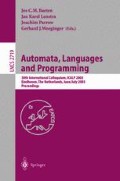Abstract
A stochastic generalisation of residual languages and operations on Probabilistic Finite Automata (PFA) are studied. When these operations are iteratively applied to a subclass of PFA called PRFA, they lead to a unique canonical form (up to an isomorphism) which can be efficiently computed from any equivalent PRFA representation.
Access this chapter
Tax calculation will be finalised at checkout
Purchases are for personal use only
Preview
Unable to display preview. Download preview PDF.
References
Rabiner, L.R.: A tutorial on hidden Markov models and selected applications in speech recognition. Proceedings of the IEEE 77 (1989) 257–285
Jelinek, F.: Statistical Methods for Speech Recognition. The MIT Press, Cambridge, Massachusetts (1997)
Freitag, D., McCallum, A.: Information extraction with HMM structures learned by stochastic optimization. In: AAAI/IAAI. (2000) 584–589
Baldi, P., Brunak, S.: Bioinformatics: The Machine Learning Approach. MIT Press (1998)
Durbin, R., Eddy, S., Krogh, A., Mitchison, G.: Biological Sequence Analysis: Probabilistic Models of Proteins and Nucleic Acids. CUP (1998)
Casacuberta, F.: Some relations among stochastic finite state networks used in automatic speech recognition. IEEE Transactions on Pattern Analysis and Machine Intelligence PAMI-12 (1990) 691–695
Carrasco, R., Oncina, J.: Learning stochastic regular grammars by means of a state merging method. In: International Conference on Grammatical Inference, Heidelberg, Springer-Verlag (1994) 139–152
Carrasco, R.C., Oncina, J.: Learning deterministic regular grammars from stochastic samples in p olynomial time. RAIRO (Theoretical Informatics and Applications) 33 (1999) 1–20
Thollard, F., Dupont, P., de la Higuera, C.: Probabilistic DFA inference using Kullback-Leibler divergence and minimality. In: Proc. 17th International Conf. on Machine Learning, (KAUFM) 975–982
Higuera, C.D.L., Thollard, F.: Identification in the limit with probability one of stochastic deterministic finite automata. In: Grammatical Inference: Algorithms and Applications, 5th International Colloquium, ICGI 2000, Lisbon, Portugal, September 11–13, 2000; Proceedings. Volume 1891 of Lecture Notes in Artificial Intelligence., Springer (2000) 141–156
Denis, F., Lemay, A., Terlutte, A.: Learning regular languages using RFSA. In Springer-Verlag, ed.: Proceedings of the 12th International Conference on Algorithmic Learning Theory (ALT-01). Number 2225 in Lecture Notes in Computer Science (2001) 348–359
Denis, F., Lemay, A., Terlutte, A.: Learning regular languages using non deterministic finite automata. In: ICGI’2000, 5th International Colloquium on Grammatical Inference. Volume 1891 of LNAI., Springer Verlag (2000) 39–50
Esposito, Y., Lemay, A., Denis, F., Dupont, P.: Learning probabilistic residual finite state automata. In: ICGI’2002, 6th International Colloquium on Grammatical Inference. LNAI, Springer Verlag (2002)
Denis, F., Lemay, A., Terlutte, A.: Residual Finite State Automata. Fundamenta Informaticae 51 (2002) 339–368
Balasubramanian, V.: Equivalence and reduction of hidden markov models. Technical Report AITR-1370, MIT (1993)
Paz, A.: Introduction to probabilistic automata. Academic Press, London (1971)
Mohri, M.: Finite-state transducers in language and speech processing. Computational Linguistics 23 (1997) 269–311
Allauzen, C., Mohri, M.: Efficient algorithms for testing the twins property. Journal of Automata, Languages and Combinatorics (to appear, 2002)
Author information
Authors and Affiliations
Editor information
Editors and Affiliations
Rights and permissions
Copyright information
© 2003 Springer-Verlag Berlin Heidelberg
About this paper
Cite this paper
Denis, F., Esposito, Y. (2003). Residual Languages and Probabilistic Automata. In: Baeten, J.C.M., Lenstra, J.K., Parrow, J., Woeginger, G.J. (eds) Automata, Languages and Programming. ICALP 2003. Lecture Notes in Computer Science, vol 2719. Springer, Berlin, Heidelberg. https://doi.org/10.1007/3-540-45061-0_37
Download citation
DOI: https://doi.org/10.1007/3-540-45061-0_37
Published:
Publisher Name: Springer, Berlin, Heidelberg
Print ISBN: 978-3-540-40493-4
Online ISBN: 978-3-540-45061-0
eBook Packages: Springer Book Archive

